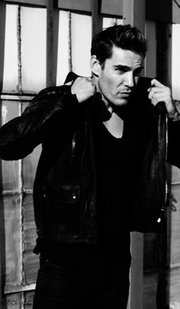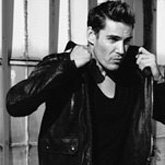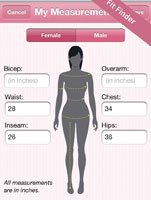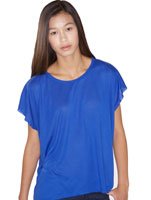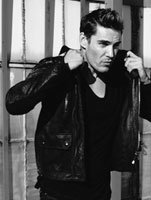NBC’s ’Fashion Stars’ Embrace Downtown L.A. for New Store and Manufacturing
Long before landing in the spotlight of NBC’s “Fashion Star,” designer Nicholas Bowes had discovered Los Angeles’ Fashion District.
The Australian model-turned-designer moved to Los Angeles four years ago to expand his street-chic KRMA line and met his wife, who worked for American Apparel. Bowes now produces KRMA and his new Nicholas Bowes men’s line out of his downtown factory, Rich Honey, and recently started manufacturing all of “Fashion Star” Lizzie Parker’s lines.
The pair started working together after finishing filming of the show 10 months ago, when Parker discovered manufacturing in Los Angeles was easier than having production done overseas or in Seattle, where she’s based.
“I had attempted to manufacture in Seattle when I first started, but the sewers were mostly geared toward polar fleece and things like Lululemon activewear, and they didn’t understand bamboo and rayon,” she said. “I did offshore one order, which was a nightmare—everything came back wrong—so then I started doing manufacturing in my store.”
Parker’s store, Lizzie Parker, is located in Issaquah’s Gilman Village, an outdoor shopping center near her home in the suburbs of Seattle.
“After I left the show, I gave Nick a call and went down to his factory, and he did a couple of small runs for me for my main label, and we gradually started working together,” she said.
Parker’s new Lizzie Parker Blue Label line, which is produced in Bowes’ factory, was recently picked up by Nordstrom Rack and will be in stores starting June 1.
“It’s one of those things where both of us have been around 10 years, and this just worked. It was the right product at the right time with the right store,” she said.
The line is a lower-priced “fashion-forward” line for women, with everything priced under $25.
“We speak 10 times a day anyway, and it’s one of those things that just came up in conversation. It wasn’t planned from scratch,” Bowes said.
Each item will have one “fun fashion detail,” such as an asymmetrical hem, as well as great fit and fabrics, Parker said. “It’s a lot of fashion for the buck.”
The ability to offer high-quality fast fashion at a low price stems from keeping production in Los Angeles, Bowes said.
“We’re pretty much offering garments that retail for $69 or $70 at a very low price because we’re manufacturing in L.A.”
Using his seasoned team of experienced in-house cutters and sewers allows him to produce lines at a low cost, and purchasing 70-inch fabric to obtain more yield from sizes drops the cost per garment, which also “makes a huge difference,” he said.
Keeping production at his own factory not only costs less but also allows him to produce more quickly. “A lot of companies can’t do that because they outsource production, but we can compete with China’s prices in L.A.,” he explained.
“I can pretty much dye six, seven, eight colors and patterns, sampling a full line in just over a week, which fits Nordstrom’s program. They’re looking to buy on a monthly basis with new styles and new shapes.”
Despite the speed-to-market, the line still retains the quality of the pair’s other lines, Bowes said.
“The quality is still 100 percent—the same as Lizzie Parker Black Label and KRMA. Everything is on that A-list level,” he said.
Parker said they hope to grow with Nordstrom and eventually offer all of their brands through the retailer.
In the immediate future, Bowes is opening a new store in the heart of the Los Angeles Fashion District. Nicholas Bowes Co-Op will open on Eighth Street between Broadway and Spring Street on June 14. The store will carry Lizzie Parker Black Label, KRMA and Nicholas Bowes, as well as a variety of jewelry lines.
“Now is a perfect time,” Bowes said. “I love being downtown. It’s becoming a mini version of New York. With the opening of the new Umami Burger and all that’s going on, it’s a different vibe. That block is having a resurgence.”
Bowes had originally planned on opening a store in Australia but was drawn to the renaissance of downtown Los Angeles.
“It makes things a lot easier to be close to my house and the factory. I believe that I’m looking at the future of downtown, and I want to be part of that growth,” he said.
New technology
Also on the horizon is a new fashion app that Parker helped develop, which launched May 15.
“There has been an explosion of fashion apps. There’s something happening with fashion and technology right now,” Parker said. “We noticed that there’s a lot of pictures and posting, but we asked what value would we be adding? Something that’s missing is fit.”
The app, named Mannequin, is what Parker refers to as a “mobile stylist.” It records body measurements from the user, along with gathering information from individual brands and the community of other Mannequin users to formulate accurate information on how various brands fit. A person who is a size 10 in one brand may not be a size 10 in a different brand, and the application helps take the guesswork out of shopping, Parker said.
“Once you continue to seed in your information, it becomes more and more accurate. If you’re size this at the Gap, then you’re size that at Banana Republic,” she explained. “The more data we have, the more we can come together. We hope it becomes a very active and vocal community.”
The app also allows users to create a virtual closet of clothes they want to purchase and share the images with friends for comments and feedback as to whether or not they should buy an item.
“Shopping has changed,” Parker said. “People used to do it for a hobby. Now it’s a task, and most people want a friend’s opinion.”
The virtual closet can be assembled by photographing items and uploading the images or by tagging them in Mannequin’s online image library.
“You can tag things you want, or you can organize your looks—‘Here’s what I would wear for a party. Here’s what I would wear for a trip,’” she said.
All of the data, including users’ measurements, is kept private unless they choose to share them, and, even then, they’re only shared with a close circle of friends set up by the user.
“We don’t want a community where people are mean to each other. It’s a closed social circle,” she said. “A social virtual dressing room.”
Mannequin also offers celebrity feeds with daily news about what’s happening in fashion, what trends are taking off, who’s on the red carpet, what celebrities are wearing and how to get the look, Parker explained.
In the future, they plan to offer user-controlled GPS options, allowing users to digitally announce their presence when they walk into a store so that sales associates can provide them with personalized customer service based on their profile.
Mannequin Chief Executive and co-founder Prashant Sridharan knew Parker before she was a designer, when she worked at Microsoft. After finding out that she was now working in fashion, he enlisted her to help him and co-founder Aaron Brethorst.
Their vision for the app, he said, was to address three questions: Will this product fit me? What do my friends think about this product? How do I get better service in the store?
“When we were thinking about it, we could solve a problem that a lot of retailers have—sales associates not being able to match customers up with clothes that are their fit and style,” he explained. “It enables them to deliver personalized services when someone walks in the front door and solve the problem many customers have.”
The app launched in Apple’s iTunes store and online through the Mannequin website (http://www.mannequinapp.com) and is currently only customized for iPhones.
